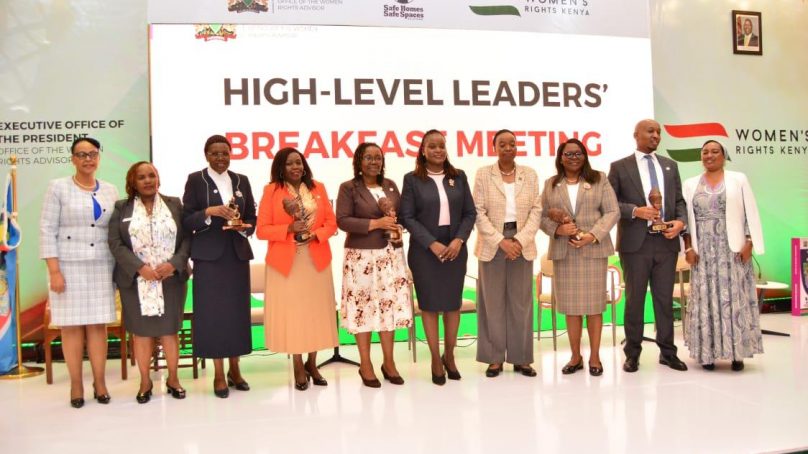
Kenya has given assurance to women empowerment, terming it a central pillar of socio-economic transformation.
During a high-level forum on women’s empowerment in the capital, Nairobi, Presidential National Security Advisor Monica Juma, said Kenya’s prosperity and stability depend on unlocking the full potential of women and girls, and assured that the government would continue prioritising their inclusion.
“No country can prosper sustainably when it excludes more than half of its population. Women’s empowerment is not just a human right; it is good governance, good security and the foundation of a healthy society,” she said.
Dr Juma underlined the deliberate actions required to ensure that women are fully engaged in new and emerging spaces. She cautioned that technological disruption, climate change and financial shifts could erode gains made in gender equality if inclusivity was not secured.
“We must look beyond legacy struggles. The new frontier is technology, artificial intelligence and financial wellness. Women must not be left behind in these spaces,” she added.
“If you want to go fast, go alone. If you want to go far, go together. Let us choose to go together so that every woman, every girl and every child in Kenya is protected, valued and empowered – not just to survive, but to thrive,” Juma said.
The national security advisor added that measurable results and bold investments were required to advance women’s empowerment, cautioning that exclusion undermines equality and threatens national security.
Chief Justice Martha Koome underscored judiciary’s determination to safeguard women’s rights and enhance access to justice.
In a speech read on her behalf by President of the International Association of Women Judges Hellen Omollo, CJ Koome highlighted the establishment of gender justice courts to handle sexual and gender-based violence cases, affirmative action in judicial appointments and the enforcement of anti-harassment policies as important steps in promoting equality.
“Women cannot participate meaningfully in public life if their rights are routinely violated without remedy. Legal guarantees must be matched with enforcement and cultural change,” Koome said.
She added that the judiciary is prioritising community-based initiatives and outreach programmes to dismantle systemic barriers that prevent women, particularly the vulnerable, from accessing justice.
Chief Executive Officer of Kenya Deposit Insurance Corporation Hellen Chepchumba underscored the role of financial inclusion in empowering women and strengthening families. Ms Chepchumba said the government had strengthened frameworks to protect depositors and enhance stability in the banking sector.
“KDIC provides protection of up to Ksh500,000 in the event of bank collapse,” she explained, noting that the scheme currently covers 52 banks.
“Our mandate is to make sure that families and communities do not lose their hard-earned savings,” Chepchumba said.
She observed that although Kenya’s banking sector had previously experienced turbulence, particularly in the 1980s and 1990s, stronger frameworks had since been put in place to enhance resilience and safeguard public confidence.
“When women rise, nations rise with them. KDIC will continue to safeguard investments and stand shoulder-to-shoulder with institutions advancing financial inclusion,” Chepchumba added.
Chief Executive Officer of the National Land Commission Kabale Tache said strong frameworks were necessary to protect women’s rights to land and inheritance, describing access to land as a critical driver of economic and social development.
“Together, we can move beyond isolated initiatives to a cohesive, collaborative approach that secures land rights for women,” she noted.
Tache emphasised that fair and transparent land governance would not only uplift women but also improve food security, family welfare and national prosperity.
Board Member of Women in Technology and Innovation Africa Bella Namango highlighted ongoing projects designed to equip young learners with digital skills.
She said the organisation, in partnership with the Office of the Women’s Rights Advisor, was constructing a SMART library at Mdaimunia Primary School to give pupils access to modern learning resources.
“One child, one computer, one school, one county at a time – that is our mission,” Namango stated.
She appealed for support from government, private sector and development partners, and revealed that a charity gala will be held on September 26, 2025, to mobilise resources for the expansion of the project.
In her keynote speech, Dr Monica Juma reiterated that the Women’s Charter unveiled by the government is not just a policy framework but a covenant between the state and its citizens.
“The Women’s Charter is a promise about the kind of nation we are determined to become. For it to succeed, it must become a Kenyan charter embraced by every citizen,” she said.
The forum issued a collective appeal for unity of purpose in driving Kenya’s gender equality agenda, with participants stressing that inclusive development could only be achieved through strong partnerships across government, judiciary, civil society, and the private sector.
- Tell Media / KNA report / By Lucy Mwende and Darlene Wambui







